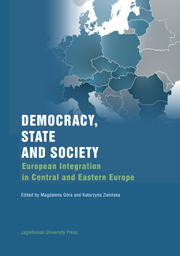Book contents
- Frontmatter
- Contents
- List of contributors
- Europeanisation in the EU New Member States. Aspects and Research Agendas
- Part one Democracy after Enlargement
- Part two Identity Transformations
- Part three Civil Society Organisations in Central and Eastern Europe
- Bottom-up Europeanisation: Civil Society Involvement and EU Governance in the New Member States
- The Europeanisation of Social Movements in the Czech Republic: the EU and Local Women's Groups
- The European Union as Political Resource: NGOs as Change Agents?
- Undiscovered Avenues? Estonian Civil Society Organisations as Agents of Europeanisation
- Part four Europeanisation of International Relations
- Index
The Europeanisation of Social Movements in the Czech Republic: the EU and Local Women's Groups
from Part three - Civil Society Organisations in Central and Eastern Europe
Published online by Cambridge University Press: 05 September 2014
- Frontmatter
- Contents
- List of contributors
- Europeanisation in the EU New Member States. Aspects and Research Agendas
- Part one Democracy after Enlargement
- Part two Identity Transformations
- Part three Civil Society Organisations in Central and Eastern Europe
- Bottom-up Europeanisation: Civil Society Involvement and EU Governance in the New Member States
- The Europeanisation of Social Movements in the Czech Republic: the EU and Local Women's Groups
- The European Union as Political Resource: NGOs as Change Agents?
- Undiscovered Avenues? Estonian Civil Society Organisations as Agents of Europeanisation
- Part four Europeanisation of International Relations
- Index
Summary
Abstract: The goal of this paper is to analyse the impact the EU has had on Czech women's groups since the 1990s. Drawing on both Europeanisation and social movement theories, the first section defines the theoretical framework of the paper. The second section is focused on the impact of changes in the funding of women's groups which, since the end of the 1990s, have relied more than before on European funding. The third section analyses the shift in the political context and the domestic political opportunity structure in the Czech Republic that has occurred in connection with the accession process. The fourth section looks at transnational cooperation for which new opportunities have appeared with the EU's eastward expansion. The paper concludes by summarising its main findings.
Introduction
Since the fall of communism, the East Central European countries have experienced tremendous changes in their politics and civil societies. This post-communist transformation has been at the centre of scholarly attention since then. Recently this body of literature has been accompanied by studies focusing on the consequences of yet another important transformation, this time induced by the integration of East Central European countries into the European Union (EU). Understandably, these Europeanisation studies have predominantly taken notice of the changes brought about by EU accession in the political institutions and policies of new member states. Civil society actors, interest groups, and social movements have thus far remained somewhat overlooked.
- Type
- Chapter
- Information
- Democracy, State and SocietyEuropean Integration in Central and Eastern Europe, pp. 179 - 200Publisher: Jagiellonian University PressPrint publication year: 2011



